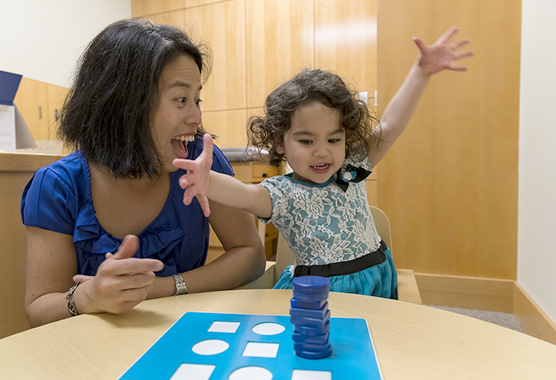Congenital Abnormalities
For all types of anomalies present at birth, we provide expert care and support.
Medically reviewed by Amy Powne, R.N. on June 29, 2023.

Partners in Your Care
At UC Davis Health, we are your lifelong partners in care. From preconception counseling to pregnancy, childbirth and beyond, you’ll find the services and support you need to help your child thrive.
What Are Congenital Abnormalities?
Congenital abnormalities, also known as birth defects or congenital disorders, are conditions that occur as your unborn child (fetus) develops. Some disorders are life-threatening, while others have no visible signs.
Congenital abnormalities can affect your child’s appearance, how their body functions or both. Examples of some common congenital abnormalities include:
Chromosomal Disorders
Congenital Abnormalities
- Cleft lip or cleft palate
- Congenital diaphragmatic hernia
- Congenital heart diseases
- Gastroschisis
- Limb abnormalities, such as an extra thumb or toe
- Neural tube defects, such as spina bifida
- Twin-to-twin transfusion syndrome
Fetal Conditions
- Amniotic band syndrome
- Fetal anemia
Tumors and Masses
- Lung masses
- Neck masses
- Sacrococcygeal teratoma
You may find out during pregnancy, after birth or later in life that your child has a congenital abnormality.
Causes of Congenital Abnormalities
While some congenital abnormalities have known causes, health care providers are not exactly sure why most happen. Potential causes include:
Genetic Changes (Mutations)
Genes are stretches of DNA that carry instructions for everything your cells do. Changes in some genes can affect how your baby develops.
Chromosomal Abnormalities
Chromosomal abnormalities are changes in the number or form of chromosomes (structures that carry genes). These changes can interfere with fetal development.
Prenatal Exposures
Contact with substances such as chemicals, radiation and organisms that cause infections can lead to congenital disorders.
Risk Factors for Having a Child With Congenital Abnormalities
Age
The risk of chromosomal changes rises the older you are during pregnancy.
Family History
Some congenital abnormalities may run in families.
Health Conditions
Obesity, poorly controlled diabetes, fever and other medical conditions may increase your risk of having a baby with a congenital abnormality.
Infections
Certain infections during pregnancy, such as toxoplasmosis from cat feces and Zika virus, are linked to congenital abnormalities. Learn more about Zika virus (PDF).
Lack of Folic Acid
Not getting enough folic acid in your diet increases the risk of neural tube defects, such as spina bifida.
Medication Use
Some prescription medications can affect the health of your unborn child.
Unhealthy Behaviors
Drinking alcohol, smoking and using drugs while pregnant are associated with congenital abnormalities.
Diagnosing Congenital Abnormalities
Health care providers diagnose most congenital abnormalities at birth or within the first year of birth. Early diagnosis can help your child get the care needed to lessen the long-term effects of their condition.
Health care providers detect some congenital abnormalities during prenatal testing and screening. Routine tests include ultrasound imaging and blood tests.
If you are older than 35 or have a family history of congenital abnormalities, your provider may recommend more specific tests. Our Prenatal Diagnosis Centers provide complete prenatal testing and consultations.
Congenital Abnormality Care at UC Davis Health
At UC Davis Health, our specialists have extensive experience in diagnosing and treating congenital abnormalities. We are here for you and your child at every step with expert care, guidance and support. Our programs and services include:
High-Risk Obstetrical Care
We offer expert care for pregnancies at high risk of complications due to maternal and fetal conditions, including congenital abnormalities.
Fetal Care and Treatment Center
Nationally recognized physicians diagnose and treat fetal abnormalities using a range of approaches, including advanced fetal surgery.
Birth Center
Our labor and delivery teams are highly trained and well-prepared for high-risk deliveries.
Neonatal Intensive Care Unit (NICU)
As a level 4 NICU, we have the experience and technology to care for infants born with serious congenital abnormalities.
Pediatric and Cardiac Intensive Care Unit (PCICU)
Children with congenital heart or other congenital abnormalities receive lifesaving treatment in our PCICU.
Pediatric Specialty Care
No matter what type of specialty care your child needs, you’ll find it at UC Davis Health.
Preventing Congenital Abnormalities
You cannot prevent all congenital abnormalities, but good health and nutrition can improve your chances of having a healthy baby. Steps you can take include:
- Checking with your health care provider before taking any prescription or over-the-counter medications
- Eating healthy and avoiding alcohol, smoking, and drugs
- Managing health conditions
- Preventing infections and fevers
- Taking 400 milligrams of folic acid daily before and during pregnancy
Who does it affect?
1 in 33Children born in the U.S. have congenital abnormalities
Known causes
70%Of birth defects have no known cause
Sources: Centers for Disease Control and Prevention (CDC): Birth Defects
B. Weinhold, Environmental Health Perspectives: Environmental Factors in Birth Defects: What We Need to Know
Request an Appointment
As Sacramento's No. 1 hospital, you'll benefit from unique advantages in primary care and specialty care. This includes prevention, diagnosis and treatment options from experts in 150 specialties.
Referring Physicians
To refer a patient, submit an electronic referral form or call.
800-4-UCDAVIS
Patients
Call to make an appointment.
Consumer Resource Center
800-2-UCDAVIS

Ranked among the nation’s best hospitals
A U.S. News & World Report best hospital in cardiology, heart & vascular surgery, diabetes & endocrinology, ENT, geriatrics, neurology & neurosurgery, and pulmonology & lung surgery.

Ranked among the nation’s best children’s hospitals
U.S. News & World Report ranked UC Davis Children’s Hospital among the best in pediatric nephrology, orthopedics*, and pulmonology & lung surgery. (*Together with Shriners Children’s Northern California)

Ranked Sacramento’s #1 hospital
Ranked Sacramento’s #1 hospital by U.S. News, and high-performing in aortic valve surgery, back surgery (spinal fusion), COPD, colon cancer surgery, diabetes, gynecological cancer surgery, heart arrhythmia, heart failure, kidney failure, leukemia, lymphoma & myeloma, lung cancer surgery, pacemaker implantation, pneumonia, prostate cancer surgery, stroke, TAVR, cancer, orthopedics, gastroenterology & GI surgery, and urology.

The nation’s highest nursing honor
UC Davis Medical Center has received Magnet® recognition, the nation’s highest honor for nursing excellence.

World-class cancer care
One of ~59 U.S. cancer centers designated “comprehensive” by the National Cancer Institute.

A leader in health care equality
For the 13th consecutive year, UC Davis Medical Center has been recognized as an LGBTQ+ Healthcare Equality Leader by the educational arm of America’s largest civil rights organization.

